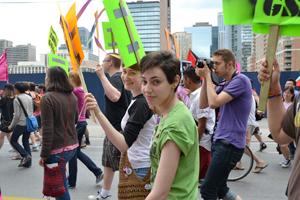
Valerie Scott smiles the day an Ontario judge ruled Canada's hooking laws unconstitutional. Credit: Marcus McCann
In the lead-up to Pride season across Canada, we look at the fights gays and lesbians are still fighting. The targets range from the courts to the media, from elementary schools to the world of professional sport. We’ve come a long way, but this list illlustrates that the work isn’t over.
1 Creating a society free of violence
Reported gaybashings continued to rise in 2009, the most recent year for which statistics are available. And, compared to racially motivated or religiously motivated crimes, gaybashings were more likely to turn violent and result in injuries, according to Statistics Canada.
2 Including all parents on birth certificates
It’s the “known donor” conundrum. One half of a lesbian couple becomes pregnant with the sperm of a friend — either through traditional means or a turkey baster. If the father is known to the couple, then the woman’s partner usually can’t be named on the birth certificate, until she goes through a second-parent adoption process. It’s one example of the paucity of clear family law surrounding gay parents and their children’s birth records.
3 Ending bullying in schools
More than one in five queer high school students reported being physically harassed by classmates, according to Egale Canada’s climate survey. The solutions — education, zero-tolerance policies, proactive principals and teachers, dedicated queer-issues staffers — must be fought school board by school board across the country.
4 Promoting gay-straight alliances in all schools
When the Halton Catholic District School Board banned gay-straight alliances in late 2010, it touched off a media firestorm and revealed disturbing details about school boards’ official policies on gay issues in Canada’s publicly funded Catholic schools.
5 Creating and delivering a non-judgmental sex-ed curriculum
Sexual education makes parents uncomfortable, but all the research suggests that age-appropriate, non-judgmental, clear, detailed sexual education — including about gay and lesbian sex — improves health outcomes for young people.
6 Adding gender identity to the Human Rights Act
With May’s federal election, the most concerted effort to date to get gender identity added to the Canadian Human Rights Act died. NDP MP Randall Garrison has vowed to reintroduce the private member’s bill, but, with a Conservative government, the future of the bill is far from certain.
7 Ending the ban on gay blood donors
A man who has had sex with a man, even once, since 1979 is forbidden from donating blood forever. University students challenged the rule — as did two gay men in separate court cases. A 2010 Canadian Medical Association Journal editorial endorsed their activism.
8 Ending the seizure of books and movies at the border
On a sunny day in 2008, Rick Frenette and his husband, Shawn, were returning to Canada from the US. When their laptop was seized because of homemade porn — which featured the couple — they joined the hundreds of gays who’ve had material seized by the Canada Border Services Agency.
9 Broadening representations of gay and trans people in mainstream media
Since at least the 1950s, gays have been concerned with their representation in the news, on television and in literature. But it took The Celluloid Closet, a 1981 book and 1995 documentary, to elevate media criticism to the realm of activism.
10 Breaking down hetero assumptions about parenting
Every year, parents are given enrolment forms, memos are distributed in schools, and children receive family tree projects that presume their parents are heterosexual. For some parents, it becomes a constant battle with school administrators, who are reluctant to recognize and accommodate gay parents.
11 Changing the culture of sport
No NHL hockey players are living out, proudly gay lives. Ditto professional baseball, football and basketball players. As we search for ways to make it easier for gay athletes to live openly, we also change the culture of casual homophobia among sports fans, and, ultimately, the country.
12 Eliminating gender from government identification and forms
While easing the burden of proof for changing the gender marker on government ID would go a long way, we also need to ask why we need gender on most of these documents at all.
13 Ensuring queer groups aren’t shut out of funding formulas
All organizations are not created equal. Canada’s funding formulas can be suspiciously vague — like a federal economic development program that supports only “family friendly” tourism — and that often means that queer groups are excluded, as Montreal’s Black & Blue festival has been since the Conservatives came to power in 2006.
14 Keeping the state out of our dungeons
Ever since the Supreme Court of Canada released its decision in R v Butler (1992), the law has taken a dim view of bondage and kink. In Butler, the court said that SM porn is inherently demeaning. Subsequent decisions, including a recent case dealing with consent to rough sex, seem to agree.
15 Ending the criminalization of HIV
HIV-positive people have been charged with sexual assault for not disclosing their status before giving blowjobs, or when they used a condom during sex, or when they had a low viral load. HIV activists point out that the law is so broad and ill-defined that poz folks don’t know what behaviours might land them behind bars.
16 Ensuring that gay refugee claimants get a fair shake
If you were asked to prove your sexuality, could you? That’s the odd predicament gay and lesbian refugees face when they arrive in Canada. And if you lived in an overwhelmingly homophobic environment, would you have photos or love letters to prove you’re gay?
17 Winning a safe labour environment for sex workers
In fighting for the decriminalization of gay sex, we said that Canadians should be free to have the kind of sex they want — so long as it’s consensual — without state intervention. Sex workers Amy Lebovitch, Valerie Scott and Terri-Jean Bedford are making that case in the courts.
18 Promoting a vibrant queer culture
Queer artists are some of the best and brightest in the country. Their work — whether transgressive, feminist, anti-authoritarian or overtly sexual — must be protected from censorship and given the space to flourish.
19 Looking after seniors and aging gay and trans people
Canada’s first generation of out, proud activist gays is gradually retiring. At some point, many will need long-term care facilities — facilities that are often run by religious groups and are notoriously prudish. The work of transforming these spaces from phobic to welcoming has just begun.
20 Including sex reassignment surgery in provincial health insurance
Ontario, BC and Quebec cover sex reassignment surgery as part of their provincial health plans. In most of the rest of the country, trans people who want surgery are on their own. Add to that the expenses of recovery, and it’s out of reach for all but a few.
21 Reducing state surveillance
During the last election, Prime Minister Stephen Harper promised to make it easier for police to track your movements on the internet. Meanwhile, airports now use full-body scanners. Gay and trans people are the frequent target of surveillance, meaning we must watch them (watching us) closely.
22 Promoting queer and human rights abroad
Increasingly, gay activists in Canada have looked to bolster gay and trans activism in other parts of the world. People in Toronto, Vancouver and elsewhere are looking to funnel resources to those fighting for gay rights in Russia, Jamaica, Uganda and elsewhere.
23 Dialling back Canada’s HIV infection rates
Infection rates are not going down. New HIV cases in 2008 and 2009 are higher than they were at the beginning of the decade. Add to that outbreaks of other sexually transmitted infections, like syphilis, and a picture emerges of prevention work in need of a shot in the arm.
24 Striking Canada’s polygamy law
Lawyers in BC are arguing whether or not Canada’s 100-year-old polygamy law should be struck, in a case that will likely go all the way to the Supreme Court of Canada. The law is so broad that mistresses, roommates-with-benefits and polyamorists could face prosecution if it is upheld.
25 Empowering youth in their sexuality
In 2008, Canada raised the age of consent from 14 to 16, but conservatives at the time grumbled that the age of consent should be 18. Meanwhile, organizations that serve youth complain that a high age of consent is a barrier to safer sex material, condoms and abortions. It’s one more front in the fight for sexual self-determination.


 Why you can trust Xtra
Why you can trust Xtra


